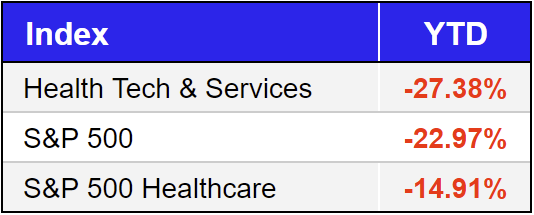Want to get these in your inbox to never miss an edition? Subscribe to Hospitalogy today!
Intro
Happy Tuesday,
I’m back (just like Voldemort) after a great, relaxing trip to Florida. How’d the golf game fare? Scroll on to find out.
CMS cuts post-acute reimbursement
This week, CMS dropped its proposed payment rule for home health. Bottom line: based on the various adjustments made in conjunction with PDGM planned adjustments, reimbursement to home health providers is expected to drop by 4.2%. That’s an $810 million decrease from 2022.
Madden’s Musing: As you can imagine, the huge cut to home health reimbursement is controversial, especially considering CMS kind of..arbitrarily cut reimbursement based on the previously announced ‘behavioral assumption adjustment.’ CMS imposed the behavioral adjustment – which is a negative 7.7% hit in 2023 – after arguing that home health agencies will change coding and documentation practices in order to maximize revenue under the new PDGM payment model. It’s notable considering that CMS didn’t appear to base the cut in much.
Along with similar adjustments to the proposed PDPM (SNF) payment structure, which is seeing a similar cut, the post-acute industry is almost certainly slated to continue to see consolidation. I mean, if your small business saw a 5% revenue cut while several input prices jumped 8% (most notably gas in home health for clinicians), you’d probably consider selling too. This quote from the HHCN article sums it up nicely:
“With significantly rising costs for staff, transportation, and more, home health agencies across the country cannot withstand the impact of the proposed rate cut,” Dombi added.
Resources:
- CMS home health proposed ruling published June 17
- Home Health Care News brief on the proposed ruling
Want to get these in your inbox to never miss an edition? Subscribe to Hospitalogy today!
Hospitals win the war on drugs
Sorry, I just had to with that headline. Anyway, the Supreme Court sided with hospitals this week on the ongoing 340B Program spat. If you don’t really care to read about the 340B program, just know that certain eligible hospitals can get discounts on outpatient drugs from manufacturers through the program, and it has probably led to some degree of exploitation as hospitals try to maximize 340B-eligible sites while drugmakers try to stifle the program altogether.
On the 15th, SCOTUS decided that HHS broke the law when it changed the payment formula for hospitals to get reimbursed on drugs from cost-plus-6% to average sales price-less 22.5%. SCOTUS said that in order for HHS to have authority to make that change, the regulatory body would first have to conduct a drug cost survey at the targeted hospitals.
Madden’s Musing: 340B is an absolute mess and likely way outside of its intended scope at this point. Big Pharma argues that hospitals are taking advantage of the program to get drugs at favorable costs and aren’t passing along those savings to patients. Meanwhile, HHS probably won’t conduct cost surveys anytime soon, considering that hospitals complain about the burden of doing so. The 340B program is yet another classic example of well-intended policy gone wrong. At this point we’re better off scaling the Mark Cuban Cost Plus Drug Company into a national operation.
The 340B Program now accounts for 15% of all pharmaceutical sales in what will continue to be a hot battleground between hospitals, big pharma, and the government.
TL;DR: HHS tries to cut drug rates to hospitals. Hospitals don’t like that. Hospitals sue. Hospitals win because HHS didn’t go about the rate cut under the right protocol, SCOTUS says that HHS cut corners. Big Pharma sad. 340B program in utter chaos.
Resources:
- Hospitals win SCOTUS case against 340B rate cuts
- Supreme Court Sides with Hospitals on Medicare Reimbursement
- You can read a good brief overview of the 340B program here
- Ballooning 340B market reaches almost 15% of 2021 US pharma sales, IQVIA finds
- Medicare could save billions on generic drugs buying at Mark Cuban’s prices
Market Movers

HCA cancelled its acquisition of Steward’s 5-hospital footprint in Utah after the FTC played hardball on the transaction. Add this merger to the list of failed hospital transactions in recent memory. I’m somewhat surprised they didn’t put up more of a fuss. Either the FTC has a lot more bite these days, the facts looked bad on market concentration numbers post-acquisition, or the health systems decided the hospitals aren’t THAT strategically important. As it always stands though, lawyers and consultants stay winning in healthcare.
Optum acquired UK-based EMIS Group for $1.5 billion, about a 50% premium to EMIS’ closing price on Thursday. What the heck does EMIS do? The firm is a software-based health tech firm focused on integrating physicians, connecting PCPs with specialists to provide seamless care across sites of service. Looks like a pretty interesting strategic acquisition for Optum and add it to the laundry list of companies the services giant is snagging at supreme discounts.
The FTC is requesting additional information on the LHC-Optum $6ish billion deal announced earlier this year. Sounds like they must have read my breakdown of the acquisition!! Jokes aside, the FTC has been BUSY – or, and I’m more inclined to believe this, it’s just been a slow news week for healthcare.
Join the thousands of healthcare professionals who read Hospitalogy
Subscribe to get expert analysis on healthcare M&A, strategy, finance, and markets.
No spam. Unsubscribe any time.
Talkspace apparently rejected a takeover deal from telehealth player AmWell. In this week’s edition of Bachelor in Paradise, Talkspace just can’t seem to find the right suitor after failing to reach a deal with Mindpath Health, too. Will they find their match? Find out next week…
Encompass opened its 150th inpatient rehab facility in Jacksonville, Florida (where a ton of IRF development is happening post-CON-repeal, if you recall from my CON overview deep dive last week) and also announced plans to open a 50-bed IRF in Naples, Florida – as part of a partnership with NCH Healthcare System.
Select Medical announced a joint venture with ShorePoint Health Venice (owned by Community Health Systems) to operate an LTACH and inpatient rehab facility in Venice, Florida. Noticing a trend for IRFs in Florida?? This is how you stay ahead of folks, by reading Hospitalogy!! (I’m only half joking).
Outset Medical shares plummeted after it announced that new shipments of its Tablo machine were on hold pending an FDA review of some changes that OM made to the hemodialysis machine.
Merck (and maybe other suitors) is reportedly looking to buy out Seagen, which would give Merck access to a nice oncology pipeline, for above $30 billion. I know I don’t talk about biotech much, but I do think it’s important to at least keep a pulse on what else is going on outside of services & tech. Ironically, Merck may get cold feet on an offer since the FTC seems to really be going after acquisitions these days.
After an activist investor scuffle, Centene announced some updates related to its Value Creation Plan (everything is named so boringly in healthcare, I swear). As a result of Medicaid eligibility redeterminations getting pushed to November 1, 2022 (a net positive for Centene, since they’re collecting those premiums) along with the aforementioned VCP, Centene upped its revenue guidance by $2 billion and EPS range by $0.15. I imagine this is writing on the wall for other Medicaid players. $2 billion is a substantial lift in revenue guidance, and Centene noted stronger than expected Q2 performance.
Capital Rx hit headlines this week after raising $106 million in a Series C led by B Capital with participation from General Catalyst (who recently partnered with Intermountain). Capital Rx plans to use the capital to continue to invest in company infrastructure and further growth initiatives. The firm seems to be highly focused on a price transparent future for drugs, which I’m all about.
Miscellaneous Maddenings
- Coke is teaming up with Jack Daniels to make a…canned Jack and Coke! A genius venture to pursue if it pans out for them. I’ll be fascinated to see how it tastes and performs in sales against the traditional drink and presumably seltzers.
- For those of you keeping tabs on my golf game, I shot a 78 in Florida on a pretty challenging but fun course. Lots of water…lotsssss of water. Shout out to Brady Ackman for guessing the closest to the actual number!
- Dallas is a host city for the 2026 World Cup!! I’m accepting visitation applications starting today.
- Somebody on Twitter (whoever you are, thank you) shared this very informative article on what things ACTUALLY work to keep mosquitoes away. It’s a huge problem in my backyard but we’ll make it through.
Hospitalogy Top Reads
- Rik Renard wrote a nice piece about patient-reported outcome measures and how these PROMs are the best path forward to achieve better patient outcomes.
- This was a nice overview of the direct primary care market, pioneers involved in the movement, and trends shaping the industry today from X=primary care
- I enjoyed this piece from Long on Humanity on a personal experience in the healthcare system and how startups still have a massive opportunity to address ignored patients – namely, autoimmune diseases.
- Kaiser Family Foundation’s Medical Debt Report dropped this week with some jawdropping statistics. Adults inthe U.S. owe at least a combined $195 billion in medical debt, and 1 in 10 Americans have ‘significant’ medical debt of over $250. It only goes to show how big of an opportunity fintech still has in healthcare, like I touched on just a couple weeks ago.
- Read this great overview of the musculoskeletal market, where digital and virtual care can fit in, the players involved, and where 4sight Health thinks the MSK market is headed.
Want to get these in your inbox to never miss an edition? Subscribe to Hospitalogy today!

